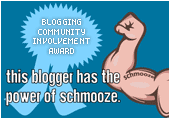When I was growing up, I never understood the bitter moods my mother got into, growling at us to earn our keep and wash the dishes/clean the bathroom/do the laundry/perform some other annoying chore. "I shouldn't have to do everything around here," she'd gripe.
(Granted, she was right. The most annoying thing about chores, however, was their inconsistency. She only insisted we do them when she was not in the mood to, or more frequently, when she was grumpy about an overall feeling of being taken for granted.)
Flash forward to 2004. My son is a year old. Constantly on the go. My husband, a teacher, has just completed two online courses he needed to receive his recertification. I am looking forward to the weekend, when he can take the boy and I can work unhindered on the computer for several hours straight.
My husband instead says it would "make his weekend" if we all went out for breakfast on Saturday after making a bank run. Sure, I think, sounds like fun. We go to the bank. But not out to breakfast - neither of us is hungry. Home now, he decides it's a good time to go to the dump. After all, our son is upstairs in his crib, supposed to be napping. But it's molar season in our house, so after just 10 minutes, I go upstairs to get the poor crying child.
At 2 p.m. I understand exactly how my mother felt. The day feels like it's long over, and this was supposed to be "my" weekend, and I got not a lick of work done. I go grocery shopping.
My husband and I have talked about this before. I've told him that he needs to give me time, preferably without my having to ask for it, although he tells me that he needs me to tell him when I need time. I suppose it would be best for our marriage if I work on communicating better. And I have been. I told him on Wednesday that I was hoping to spend the weekend working.
Two issues are at play here. The first is that the same terms mean different things to men and women. When I say "weekend," I mean the better part of Saturday and probably some of Sunday too. I also mean for my husband to take charge of toddler entertainment for the day. When he hears "weekend," he hears a couple of always-flexible hours on either Saturday or Sunday.
The second is that he doesn't understand, as most men don't, that most women are hard-wired to respond to their families' needs ahead of their own, sometimes even at the expense of their own sanity. He doesn't understand that when he says going out to breakfast would make his whole weekend, that some little trigger in my brain drops every plan I have ever had for that time, that Being A Family means I am not a writer for however many hours/days/weeks/months/years I am needed to be a wife and mother.
The problem is, I
am a writer. That is hard-wired into me just as much as the family-needs circuitry. Madeleine L'Engle said it best in her memoir,
A Circle of Quiet: "During the long drag of years before our youngest child went to school, my love for my family and my need to write were in acute conflict.... [T]here was I, absolutely stuck in bucology, with the washing machine freezing at least once a week, the kitchen never above 55 degrees when the wind blew from the northwest, not able to write until after my little ones were in bed, by which time I was so tired that I often quite literally fell asleep with my head on the typewriter... like a lot of other women who have quite deliberately and happily chosen to be mothers, and work at another vocation as well, I did manage to get a lot of writing done."
Never mind that L'Engle's children call her "Crosswicks" memoirs more fictionalized than her novels (
The New Yorker, April 12, 2004), and that worse, she failed to publish anything during the decade her children were small. She lived what I live, what my mother lived, what I suspect every mother lives at one time or another: A vocational duality.
Parenting experts tell us that all mothers (and fathers) need time to themselves. "It doesn't matter how you get it," they tell us, though I know profoundly how untrue this is. An hour-long swim per day makes no difference to my beleaguered soul when I haven't written a word of fiction in a week. I suspect, when my mother expressed her resentment, that she was really trying to grab time for herself: time to read, time to work on embroidery, time to knit. And I further suspect, that since it never seemed to fill the void, what she really needed was to give in to her duality. She was a writer, too, and by now her dreams are long gone.
My hope is not to give in to my duality to such an extent that one wins out over the other: for writing to alienate my child, for my child to sap the creative energy that keeps me going. I'd like to believe that the two can not only coexist, but reinforce each other: that taking time for myself will enable me to give time to my son, that spending time with him will send me back to the writing. He should see me working; he needs to see his Mommy is a distinct person. But it shouldn't be at his expense.


